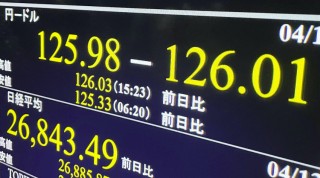Loading
Search
▼ Yen Plunges To Nearly 20-Year Low Against U.S. Dollar
- Category:Other
The Japanese yen plunged to its lowest level against the U.S. dollar in nearly 20 years on Wednesday, as the unit continued its fall amid the prospect of a widening monetary policy gap between the Bank of Japan and the U.S. Federal Reserve.
The currency sank to the lower 126 yen level against the dollar during Tokyo trading, its weakest level since May 2002, after having moved mostly in the lower and mid-125 yen range earlier in the day.
The Japanese currency accelerated its fall against the U.S. dollar in the afternoon after the Bank of Japan Governor Haruhiko Kuroda expressed his intention to continue Japan's ultraeasy monetary easing.
"Kuroda's strong commitment to monetary easing at a point when the dollar was hovering around 125 yen" fueled dealers to unleash the Japanese currency, said Yuji Saito, head of foreign exchange department at Credit Agricole Corporate & Investment Bank in Tokyo.
Dealers may test the 130 yen line after surpassing the 125 yen threshold, he said.
The yen's rapid depreciation in recent weeks comes on the back of contrasting approaches by the two central banks.
The Fed decided last month to raise key interest rates for the first time since 2018 to tackle soaring inflation.
In contrast, the BOJ has maintained its powerful monetary easing, and conducted an emergency bond buying operation last month to keep 10-year Japanese government bond yields from rising above their implicit upper limit.
Dealers have unloaded the Japanese currency amid prospects of widening interest rate differentials between the United States and Japan.
The dollar was trading in the 115 yen range at the beginning of March.
The rapid weakening of the yen has raised concerns about the negative impact it will have on Japan's economic recovery from the coronavirus pandemic at a time when energy and commodity prices are rising.
A weak yen inflates import costs for resource-scarce Japan, but helps exporters by boosting their overseas profits when brought back home.
Top government officials expressed concerns about the yen's rapid fall. Asked about the yen's moves, Finance Minister Shunichi Suzuki told reporters, "Sharp foreign exchange moves are very problematic and we will keep a close eye" on the currency market.
Chief Cabinet Secretary Hirokazu Matsuno also said at a regular press conference sharp moves in exchange rates are "undesirable" and the government will monitor the impact of the yen's depreciation on the Japanese economy with vigilance.
On the stock market, the Nikkei finished nearly 2 percent higher as investors snapped up battered shares after the benchmark index fell the previous day to its lowest level in about a month.
The 225-issue Nikkei Stock Average ended up 508.51 points, or 1.93 percent, from Tuesday at 26,843.49. The broader Topix index finished 26.43 points, or 1.42 percent, higher at 1,890.06.
On the top-tier Prime Market, gainers were led by marine transportation, mining and rubber product issues.
The Nikkei shot higher from the start of regular trading and extended gains in the afternoon. Investors went after shares of companies that were heavily sold the previous day when the benchmark index dropped nearly 2 percent.
Marine transportation issues, which led decliners Tuesday, soared, with Nippon Yusen rising 420 yen, or 4.8 percent, to 9,120 yen and Kawasaki Kisen surging 280 yen, or 4.2 percent, to 6,890 yen.
"Investors bought on dips as stocks were sold too much the previous day. The market was also supported by a rise in U.S. stock futures and the yen's weakening," said Shingo Ide, chief equity strategist at the NLI Research Institute.
Investor sentiment also improved after U.S. consumer price index data for March, a key gauge of inflation, released Tuesday was largely within market expectations, somewhat easing concerns that the Fed may take a much more aggressive approach to curb rising inflation, brokers said.
Inflation rose 8.5 percent from the same month a year ago, driven by higher gasoline prices linked to the Ukraine crisis.
Among Prime Market shares, advancing issues outnumbered decliners 1,516 to 279, while 44 ended unchanged.
Toho soared 385 yen, or 8.8 percent, to 4,770 yen, after the cinema operator Tuesday reported upbeat earnings for its business year through February on the back of its hit animated film "Jujutsu Kaisen 0."
Bucking the upward trend, pharmaceutical firm Shionogi tanked 829 yen, or 11.1 percent, to 6,611 yen, on reports that animal testing of its oral COVID-19 drug found fetal abnormalities when administered to pregnant animals, brokers said.
The drugmaker applied for approval of the drug with Japan's health ministry in February.
Trading volume on the Prime Market fell to 1,165.82 million shares from Tuesday's 1,175.86 million.
© KYODO
- April 13, 2022
- Comment (0)
- Trackback(0)


